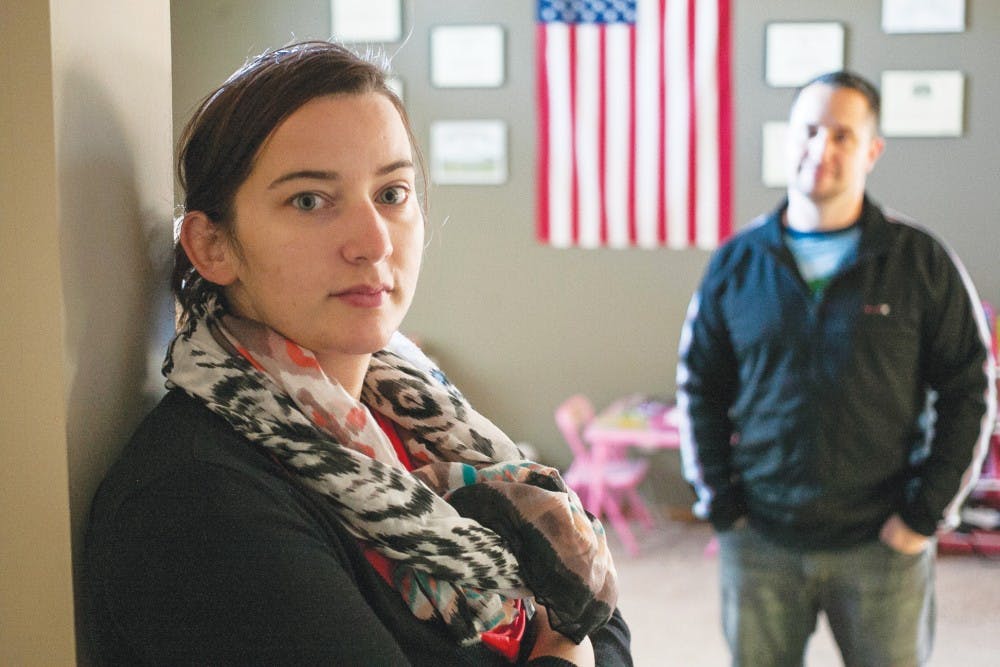It was Sept. 11, 2001. After millions of Americans watched the attacks, April Krowel stood in line for eight hours to donate blood to the Sept. 11 victims in New York and Washington, D.C.
Finally, she was at the front of the line. The nurse pricked her finger to test her blood before Krowel could make the donation. A droplet of blood fell from her finger.
Unfortunately for Krowel, her iron count was low and she wasn’t able to give blood. Rather than walking away, she chose another path.
“I was really passionate about doing something for our country,” she said. “So, I decided to give blood a different way, and I joined the military.”
Born and raised in Lebanon, Ind., Krowel joined the military when she was 17. She was a high school senior preparing for college, but instead, she turned in her acceptance letter for “a flak jacket and combat boots.”
Krowel served in the in the 101st Airborne Division at Fort Campbell, Ky., and then became a support personnel for military police in Iraq.
In September 2003, April Krowel returned from serving in Iraq, along with a few close friends she made in the military.
She struggled to return to civilian life after spending more than six months in the blistering heat of Iraq. However, for some of her friends, the transition from the battlefields to civilian life was too great to overcome. Two of them died by suicide.
“When you leave the military, you don’t lose touch necessarily, but you don’t see them as often,” Krowel said.
She paused for a couple of seconds, looked down and deeply exhaled.
“So, hearing about it was devastating.”
Every 65 minutes a veteran commits suicide, according to an investigation by the Department of Veterans Affairs.
“One of my friends died and needed help,” she said. “And I wasn’t there.”
As the statistic became a reality, Krowel committed her education to studying psychology at California State Polytechnic University, Pomona and continued her studies at Ball State. She’s pursuing her doctorate in counseling psychology with a specialization in psychology assessment.
Today, she lives with her husband, Justin, of 10 years and their three-year-old daughter, Abby, in Indianapolis. Her husband is studying for his master’s in rehabilitation counseling at Ball State. He was wounded in action in Iraq in 2003 and was awarded the Purple Heart and a Bronze Star, two of the most distinguished awards given in the military.
With her focus on studies and her family, she said her military years are behind her, but they’re a part of her life. Now she is serving on a different level — arming people with knowledge.
Krowel is studying the difference between student veterans and the average college student.
“Going into an atmosphere that’s not structured, where you can choose not to go to class, can be interesting and a challenge,” she said.
In her research, Krowel found that student veterans are seven times more likely to die by suicide than their civilian counterparts.
Jessica Robinson, a Ball State graduate student studying clinical mental health, was in the military for more than six years and spent a year in Iraq.
“I think the biggest difference coming home was learning how to interact with others that do not understand how the military works,” she said.
But Robinson said while being a veteran can be challenging, it has helped her succeed as a student.
“I’m proud to say that the military gave me more than a gun,” she said. “They have given me dedication and integrity to do my best all of the time.”
Krowel said she is proud to advocate for veterans, raise awareness and widen the scope of knowledge there is on student veterans at Ball State.
“I can relate to the population that maybe non-veterans don’t have the background experience of actually acknowledging them,” she said.





